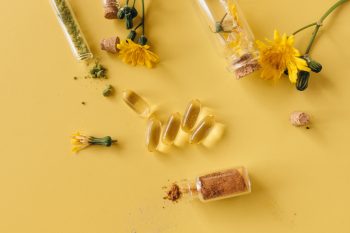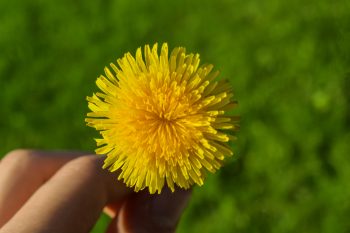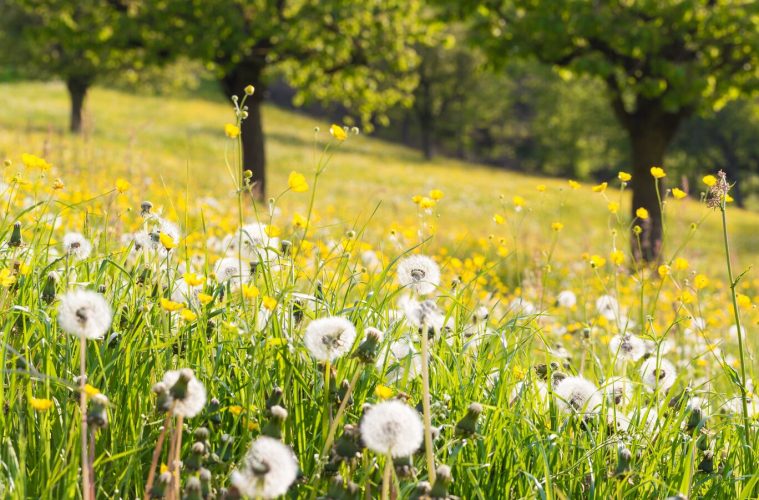Dandelions aren’t just pretty flowers that bloom to greet us before autumn sweeps in! These common yellow flowers – often found growing on the lawn – boast many health benefits!
The flower has been used in medicine for centuries for its anti-inflammatory, antioxidant, and anti-carcinogenic properties.
What if we told you that Dandelion extract is also great for your skin? We’ll explain.
The science behind Dandelion
Various studies have cited the healing properties of the Dandelion flower which has been used in medicine for centuries. The National Library of Medicine states:
“Dandelion extracts have been used for centuries for traditional Chinese medicine and native American medicine to treat cancers, hepatitis, and digestive diseases. Dandelion extracts are shown to have anti-inflammatory, antioxidant, and anticarcinogenic activities.”
Remarkable! But how does this fit into your skincare routine? We’re glad you asked.
The science behind Dandelion
Various studies have cited the healing properties of the Dandelion flower which has been used in medicine for centuries. The National Library of Medicine states:
“Dandelion extracts have been used for centuries for traditional Chinese medicine and native American medicine to treat cancers, hepatitis, and digestive diseases. Dandelion extracts are shown to have anti-inflammatory, antioxidant, and anticarcinogenic activities.”
Remarkable! But how does this fit into your skincare routine? We’re glad you asked.

Image credit: Pexels
Studies have shown that dandelion can prevent damage from UVB radiation, increase the generation of new skin cells, and reduce skin inflammation and irritation. An article published by Healthline cites three studies:
In one study, dandelion leaf and flower extracts prevented skin damage when applied just before or immediately after exposure to UVB radiation, which is the radiation you get from sunlight. Interestingly, dandelion root did not have the same effect.
An older test-tube study showed that dandelion root extract increased the generation of new skin cells, which may support your skin’s appearance as you age.
Additionally, older research indicates that dandelion extract may reduce skin inflammation and irritation while increasing hydration and collagen production. This may be useful in preventing and treating certain types of acne.
ALSO SEE:
Breaking down the skin benefits of Dandelion
Dandelion (scientifically known as Taraxacum Officinale) root, flower and leaves are extracted and used as an effective ingredient in many skincare formulas due to the multiple benefits the flower boasts, which include:
Antioxidant power
By shielding the skin from oxidative stress, Dandelion extract may help combat signs of ageing by reducing the appearance of fine lines and wrinkles.
Anti-inflammatory and antibacterial properties
Dandelion’s anti-inflammatory and antibacterial attributes also make it a potential ally for those with acne-prone skin, providing soothing, cleansing effects.
UVB damage protection
As we’ve learnt, studies have shown that Dandelion leaf and flower extract can protect human dermal fibroblasts from UVB damage and cellular senescence. This protection is attributed to the suppression of “reactive oxygen species formation” and reduction of “matrix metalloproteinase activity” which contribute to skin ageing and cancer.
Synergy with other ingredients
Due to its anti-inflammatory and antioxidant properties, dandelion synergises well with other skincare ingredients, making it a great addition to moisturisers and sunscreens.
Hydration booster
Dandelion’s rich mineral and vitamin content helps nourish and hydrate the skin from within.

Image credit: Pexels
Dandelion in your skincare routine
If you’d like to try out dandelion in your skincare routine, it’s best to look for serums, creams, or lotions that contain dandelion extract. The extract is often combined with other antioxidants in moisturisers and sunscreens in the market, so keep an eye out for the ingredients.
The application of dandelion obviously varies depending on the formulation you’re working with, and where your product falls in your routine.
Usually, serums should be applied after cleansing, while creams such as moisturiser and SPF are best used in the last steps of your skincare routine. As a general rule, apply products from the lightest to heaviest consistency, or from the most active to the least active ingredients.
Be aware of the potential side effects of Dandelion
While dandelion boasts great skincare benefits, it is crucial to be aware of potential side effects.
Some individuals may find dandelions irritating or experience allergic reactions, such as redness, flakiness, or itchiness, especially if they are allergic to ragweed, chrysanthemums, marigold, or daisies.
If you have known allergies, it is best to exercise caution and avoid dandelion-based skincare products. Patch testing on a small area of skin is recommended, particularly for those with sensitive skin.
ALSO SEE:
Feature image: Uwe Conrad via Unsplash
Originally written by Savanna Douglas and published in Woman&Home Magazine.

